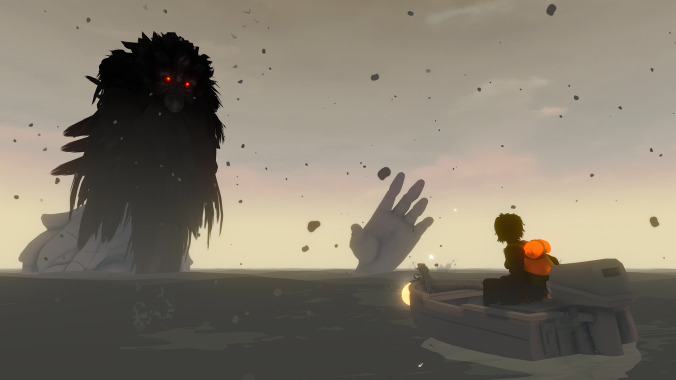Sea Of Solitude is an Attack Of The 50-Foot Metaphor

Every Friday, A.V. Club staffers kick off our weekly open thread for the discussion of gaming plans and recent gaming glories, but of course, the real action is down in the comments, where we invite you to answer our eternal question: What Are You Playing This Weekend?
Depression is no fun. As anyone who has struggled with it can attest, the effect is not just bleak, but numbing and exhausting. So it’s to the credit of indie game developers—like Jo-Mei Games’ Connie Geppert, whose company just released Sea Of Solitude—that there are ongoing efforts to address loneliness, depression, and the darker aspects of the human condition in an artistically meaningful way. But it’s also a symptom of the degree to which gaming is still in its infancy that these attempts so often generate a disjuncture between ideas and delivery.
Sea Of Solitude is quite lovely, even striking at times. You’re Kay, a young woman whose initial vague rumblings of sadness are replaced by her sudden arrival in a mysterious half-drowned city, unaware of how she got there or what’s happening. She quickly meets a glowing light of a girl whose bubbly persona leads Kay on an epic journey through the ruins, with each step on the quest unlocking new and painful memories of the past, as Kay learns not only how her past selfishness has hurt others, but also the causes of the isolation and loneliness that apparently dominated the first two decades of her life.
When it focuses on being an actual game, Sea has some great ideas. The sources of depression—and even the other people in her life—are represented by massive black monsters, meaning Kay has to find ways around them, usually by leaping from building to building, trying to stay out of the murky depths of the water where the beasts swim. (There’s a lot of hurry-up-and-wait, as Kay spends roughly half of her journey keeping an eye trained on the paths of the beasts, waiting for them to be far enough away that they won’t swim back in time to swallow her up during her aquatic leaps.) The aesthetic is old school but lush, evoking memories of Shadow Of The Colossus or Uncharted as Kay pokes her way around the abandoned sites of her memories while towering beasts loom in the background. It’s all surface-level design—you won’t be entering any of these buildings or picking up any of the detritus—but it’s a good-looking surface. And when you’re leaping across crumbling pylons hundreds of feet in the air or using bursts of light to dodge malevolent shadows of evil and transform them into cheery blue-light outlines of kids, it’s a blast.
But the integration of a deeply personal story of loneliness and depression struggles to be integrated in a meaningful way. The way the story asks you to remove black clouds from around imprisoned individuals is beyond beginner-simple, and the narrative stops dead in its tracks in ways too abrupt and inexplicable to really land with much emotion. Suddenly informing Kay that she was a pretty shitty older sister to her bullied younger brother isn’t moving, because we had no idea about any of it until the story informs us of it. “Oh, ok” is the general reaction, because you’re not really primed as a character to absorb this stuff, thanks to the choice to stick her with amnesia about everything. By the time two giant creatures representing her mother and father divorcing literally strands you in a small circle of land, running in circles while they bicker and snipe at one another, the effect is more numbing than enervating.
In other words, Sea Of Solitude would be a better game if it wasn’t trying so hard to be a more psychologically engaging game. I enjoyed playing, but trying to be better makes it worse, is what I’m driving at. If there had been a lighter touch with all the heavy-handed interpersonal drama, keeping a more abstract distance from the details, it would actually have the inverse effect of being far more moving, in part because you wouldn’t be pulled out of the game every time it wants to say something profound. I’ve noticed this is a common issue plaguing indie games. They’d be a lot more fun if they didn’t actively fight that impulse.